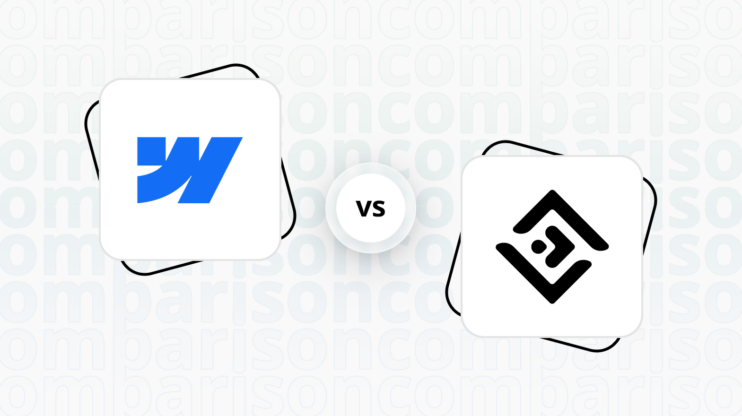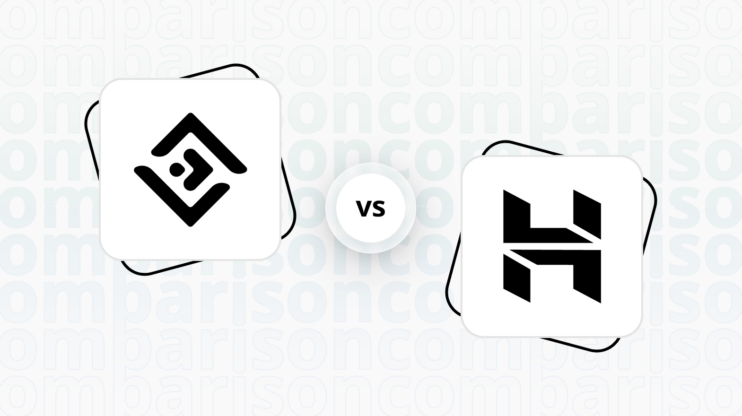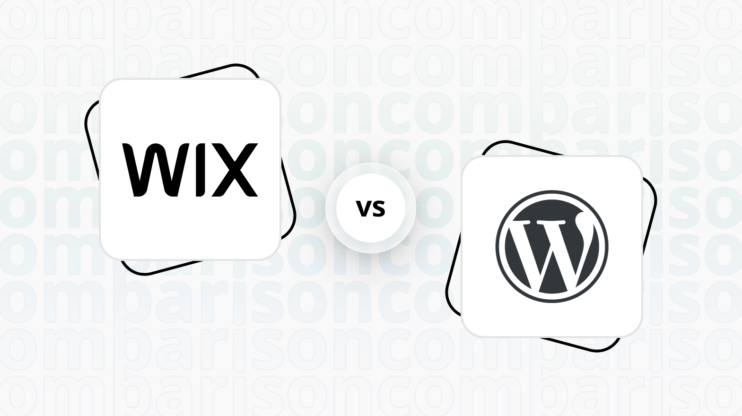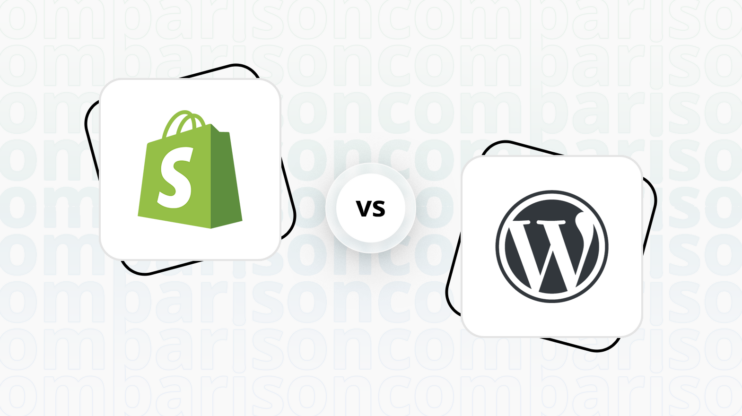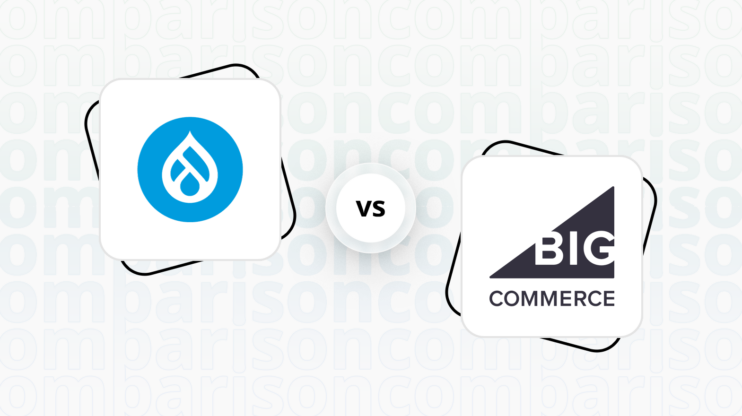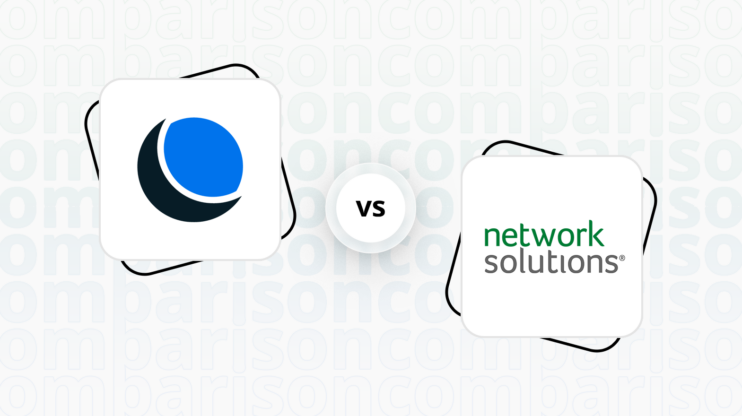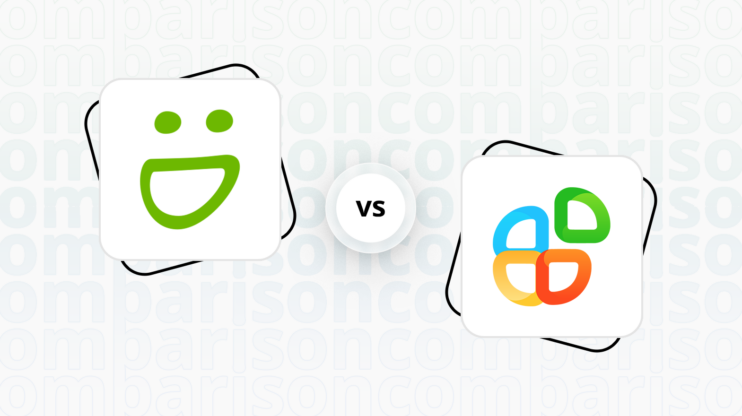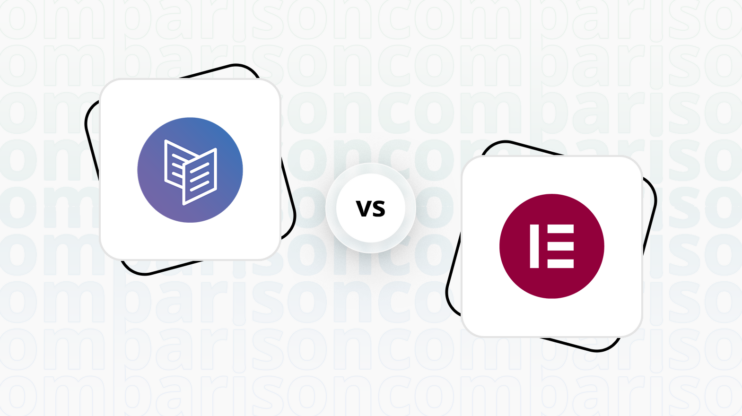Final verdict
Webflow and Hostinger Website Builder cater to different user needs, with Webflow focusing on professional design flexibility and Hostinger Website Builder emphasizing ease of use for beginners.
-
Webflow (Overall Grade: 7.9/10)
excels in providing a platform for users who prioritize design control and customization. With its powerful design tools, comprehensive CMS, and high-quality hosting, Webflow is ideal for designers and businesses looking for a sophisticated web presence. Despite its steeper learning curve, it offers extensive resources to help users maximize its capabilities. -
Hostinger Website Builder (Overall Grade: 7.1/10)
is designed for simplicity and accessibility, making it a great choice for beginners and users looking for an easy way to create and manage their websites. While it may not offer the same level of design flexibility as Webflow, its user-friendly interface and affordable pricing make it an attractive option for small businesses and personal projects.

|

|
|
|---|---|---|
|
Design functionalities & templates |
8.6 |
8.5 |
|
Ease of use |
7.5 |
8.3 |
|
Ecommerce |
8.5 |
6.1 |
|
Website Editors |
9.0 |
7.4 |
|
Product testing options |
6.3 |
6.7 |
|
Price |
8.0 |
9.0 |
|
Hosting quality |
8.9 |
7.2 |
|
Website speed optimization |
8.1 |
8.2 |
|
Plugins and integrations |
5.5 |
4.7 |
|
Marketing features |
7.8 |
5.8 |
|
Customer support |
8.3 |
7.2 |
|
Security |
7.8 |
8.2 |
|
AI capabilities |
8.3 |
6.1 |
|
User Management |
8.3 |
6.3 |
| Overall |
7.9 |
7.1 |
Best for ecommerce
 8.5
8.5
 6.1
6.1
Verdict
: For users seeking advanced ecommerce capabilities and customization, Webflow is the superior choice, offering a robust platform with extensive features. Hostinger Website Builder, while user-friendly, is more suited for smaller, simpler online stores.
-
Webflow
: With a score of 8.5, Webflow stands out for its powerful design tools and comprehensive ecommerce solutions. It’s designed for those who want detailed control over their online store’s appearance and functionality, without needing extensive coding knowledge. -
Hostinger Website Builder
: Scoring 6.1, this builder is tailored for ease of use, making it accessible for beginners. However, it may not scale as well for larger ecommerce projects due to its more basic features and limited customization options.
Best for informational & business websites
 8.6
8.6
 7.9
7.9
Verdict
: Webflow is the superior choice for informational and business websites, offering advanced design tools, a flexible CMS, and robust hosting options. Hostinger Website Builder, while user-friendly and accessible, doesn’t quite match up to Webflow’s capabilities in this area.
-
Webflow
: With a score of 8.6, Webflow stands out for its professional-grade design tools and hosting services, making it ideal for businesses looking to create custom, responsive websites. Its powerful CMS and comprehensive design flexibility cater well to the needs of informational business websites. -
Hostinger Website Builder
: Scoring 7.9, Hostinger Website Builder is praised for its ease of use and accessibility, making it a good option for those new to website building. However, it lacks the advanced design capabilities and robust hosting services that Webflow offers, making it a less optimal choice for more complex informational sites.
Detailed comparison
Design functionalities & templates
Design FunctionalitiesRepresents how well each platform allows for creative design and customization of websites.Score Components:
- Template Variety (30%): Range and quality of design templates.
- Customization (30%): Flexibility and options for design alterations.
- User Interface (20%): Ease and intuitiveness of the design process.
- Responsiveness (10%): Adaptability to different devices and screen sizes.
- Innovation (10%): Unique design features and tools.
 8.6
8.6
 8.5
8.5
🏆
Winner: Webflow.
If you’re looking for a platform that offers more creative control and a wide array of design features, Webflow is the preferred choice.
Webflow delivers a robust design experience with a diverse range of template and customization options. Boasting over 1000 pre-built templates covering various industries and website types, including free and premium options, Webflow ensures a constantly evolving library for users. Templates are categorized for easy browsing, considering industry, website type, style, and features. The design customization features include a visual drag-and-drop editor for real-time adjustments, fine-grained control over every aspect of the design, and the ability to inject custom code for advanced users seeking additional personalization and unique functionalities.
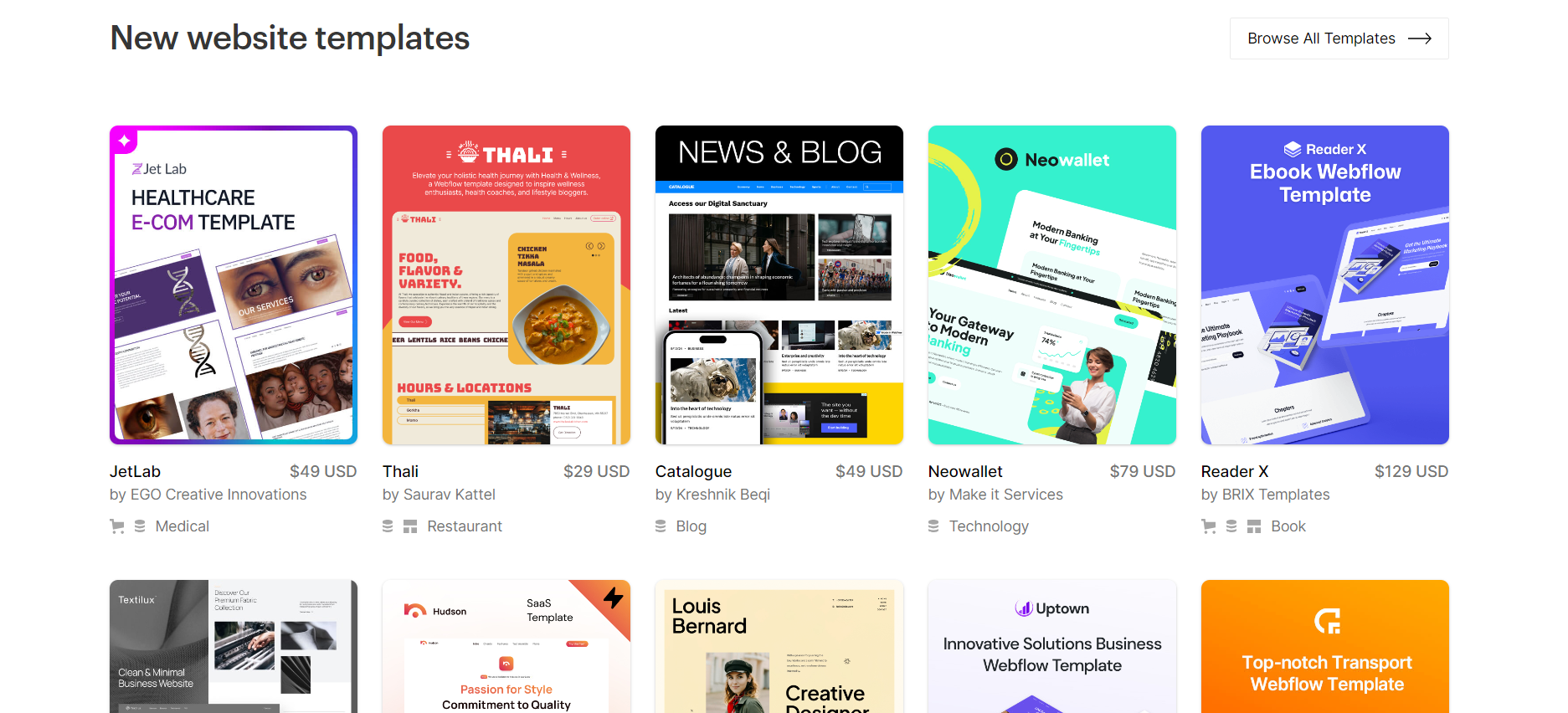
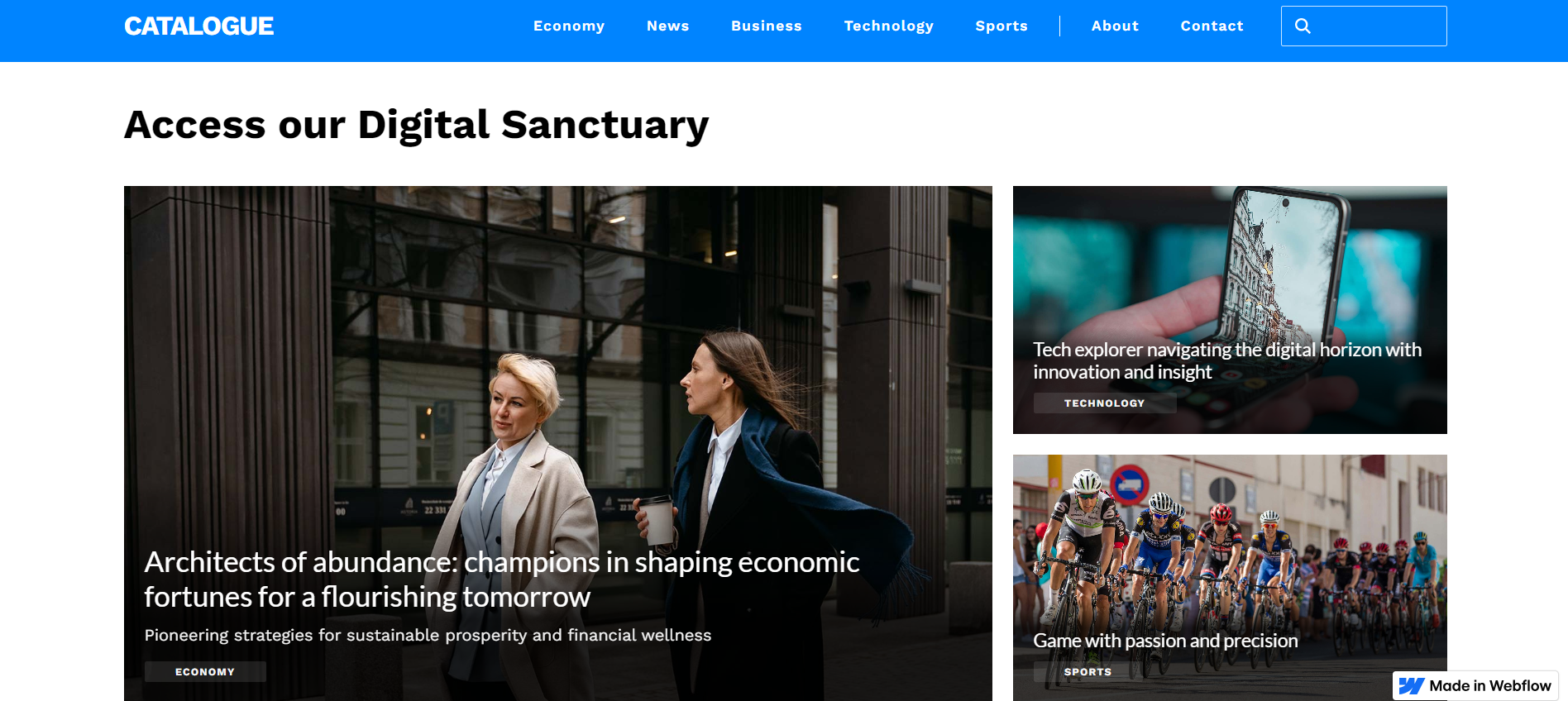
Compared to Webflow, Hostinger Website Builder offers an extensive collection of over 140 templates across various categories, including business, portfolio, blog, ecommerce, restaurant, and landing pages. These templates are fully customizable, providing design flexibility with the ability to adjust colors, fonts, layouts, and incorporate unique brand elements, while ensuring mobile responsiveness for optimal viewing on all devices.
Hostinger Website Builder Themes
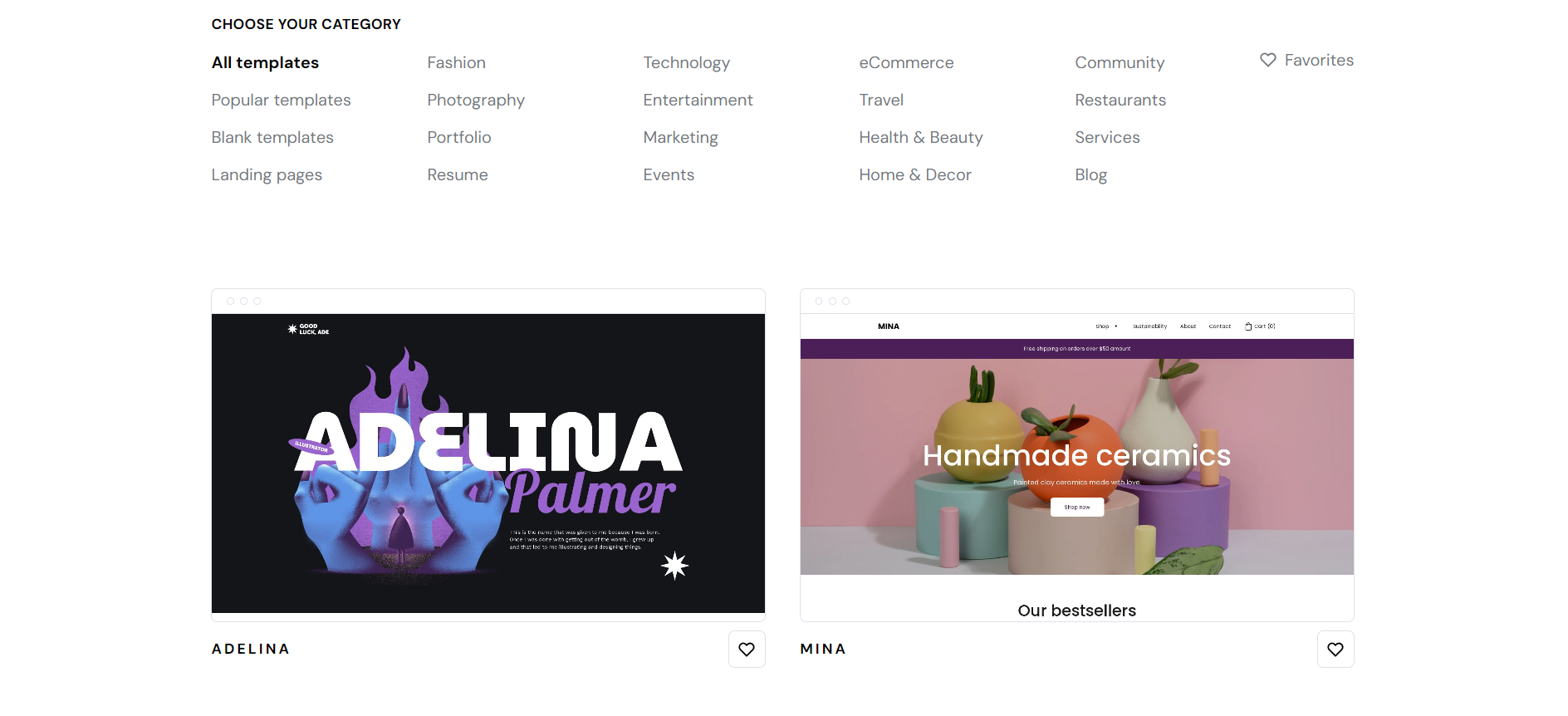
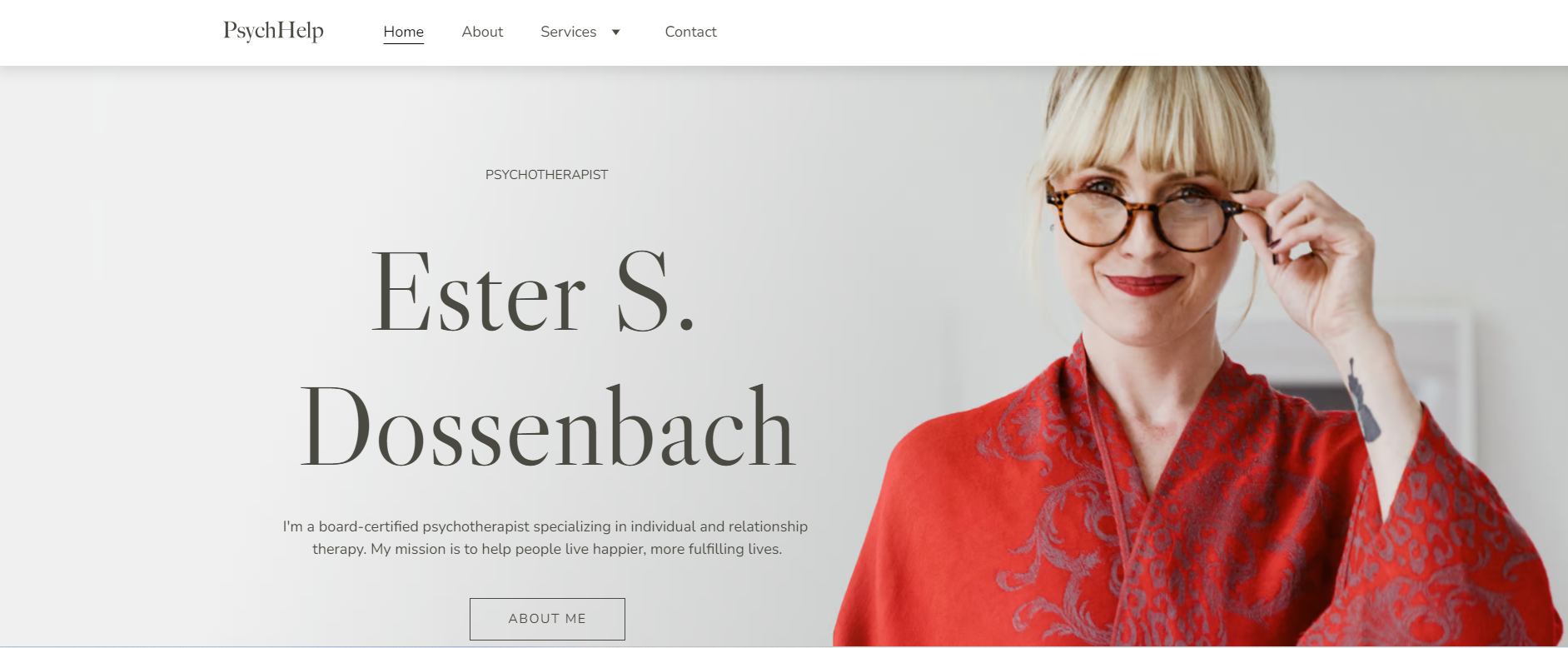
Get a head start on website creation with AI
Create a custom website tailored to your business needs 10X faster with 10Web AI Website Builder!
Ease of use
Ease of useReflects the platform’s overall user-friendliness.Score
Components:
- Learning curve (40%): Quickness and ease of getting started.
- Interface design (30%): Simplicity and intuitiveness of layout.
- User guidance (20%): Quality of tutorials and support.
- Flexibility (10%): Adaptability to various user skills.
 7.5
7.5
 8.3
8.3
🏆 Winner: Hostinger Website Builder
. With a score of 8.3, Hostinger Website Builder is more user-friendly, especially for beginners, compared to Webflow which scored 7.5. While Webflow offers a visually intuitive interface, it has a steeper learning curve which may be challenging for beginners.
Learning Resources
🏆 Winner: Webflow
. Both platforms offer a variety of learning resources, but Webflow stands out with its comprehensive set of tutorials and courses, and a thriving community of users across multiple platforms.
For ecommerce
EcommerceMeasures the platform’s effectiveness in supporting online business activities.Score Components:
- Ecommerce themes and templates (20%): Variety and design of templates.
- Product management (25%): Ease of managing and organizing products.
- Payment options (25%): Variety and convenience of payment methods.
- Ecommerce features (20%): Features for managing an ecommerce store.
- Integration (10%): Compatibility with external e-commerce tools and services.
 8.5
8.5
 6.1
6.1
When it comes to ecommerce, Webflow offers a more comprehensive solution compared to Hostinger Website Builder. Webflow’s robust platform allows for easy store creation without coding, extensive customization options, product management with variations, inventory tracking, integration with major payment gateways, automated shipping calculations, tax configuration, and marketing tools like abandoned cart recovery and email marketing. On the other hand, Hostinger Website Builder provides basic ecommerce capabilities suitable for small businesses and individual sellers, but it may face scalability challenges and offers fewer integrations compared to dedicated ecommerce platforms.

|

|
|
|---|---|---|
|
Ecommerce themes and templates |
7.5 |
6.5 |
|
Product page customization |
8.3 |
5.8 |
|
Payment processing and commissions |
7.8 |
7.0 |
|
POS capabilities |
6.5 |
4.5 |
|
Payment gateways |
8.0 |
7.5 |
|
Product numbers |
7.0 |
6.0 |
|
Additional ecommerce features |
7.9 |
6.2 |
Webflow ecommerce features:
- Checkout and Payment Processing with Stripe, PayPal, etc.
- Marketing and Promotions
- Tax and Shipping calculations
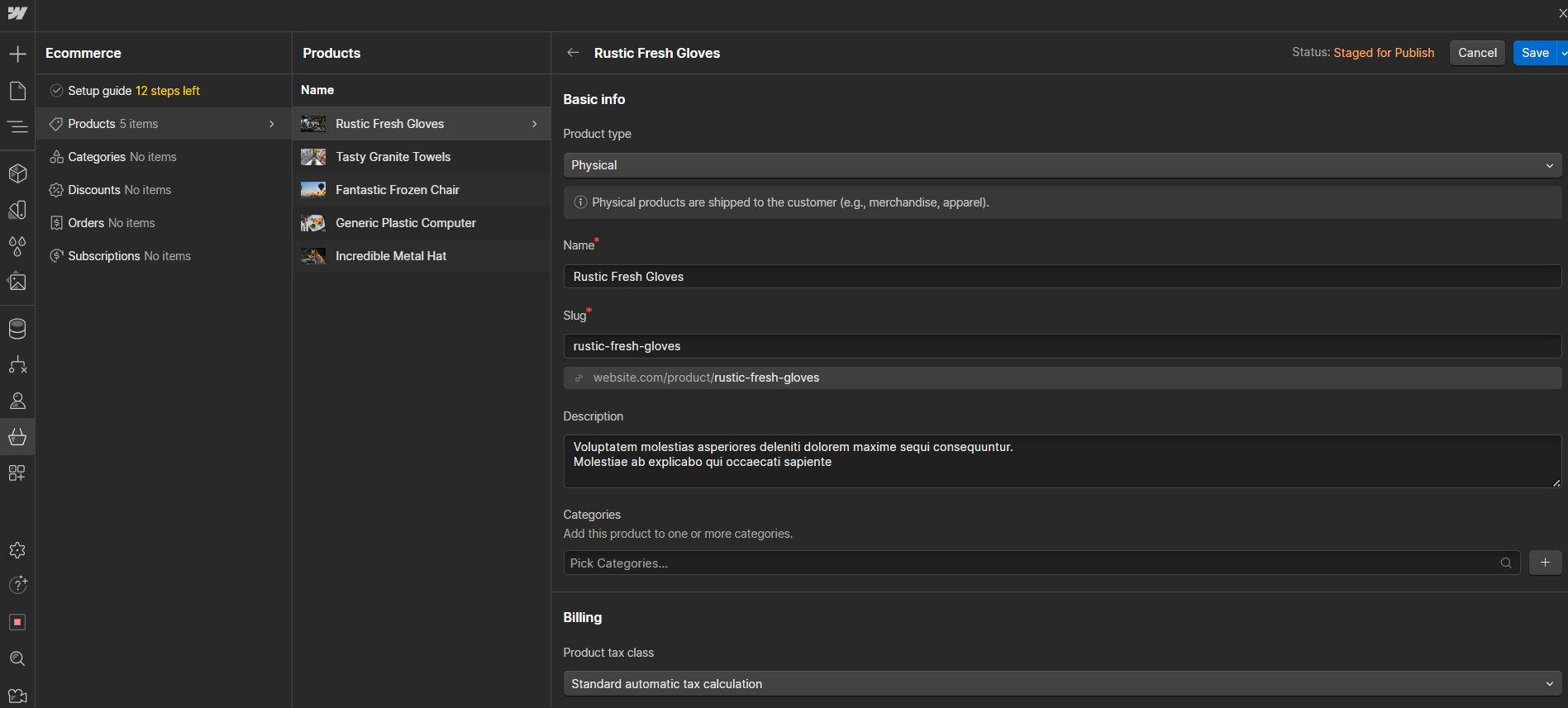
Hostinger Website Builder ecommerce features:
- Product Catalog Management
- Inventory management
- Taxes and shipping
- Payment gateways
- Order management
- Discount coupons and promotions
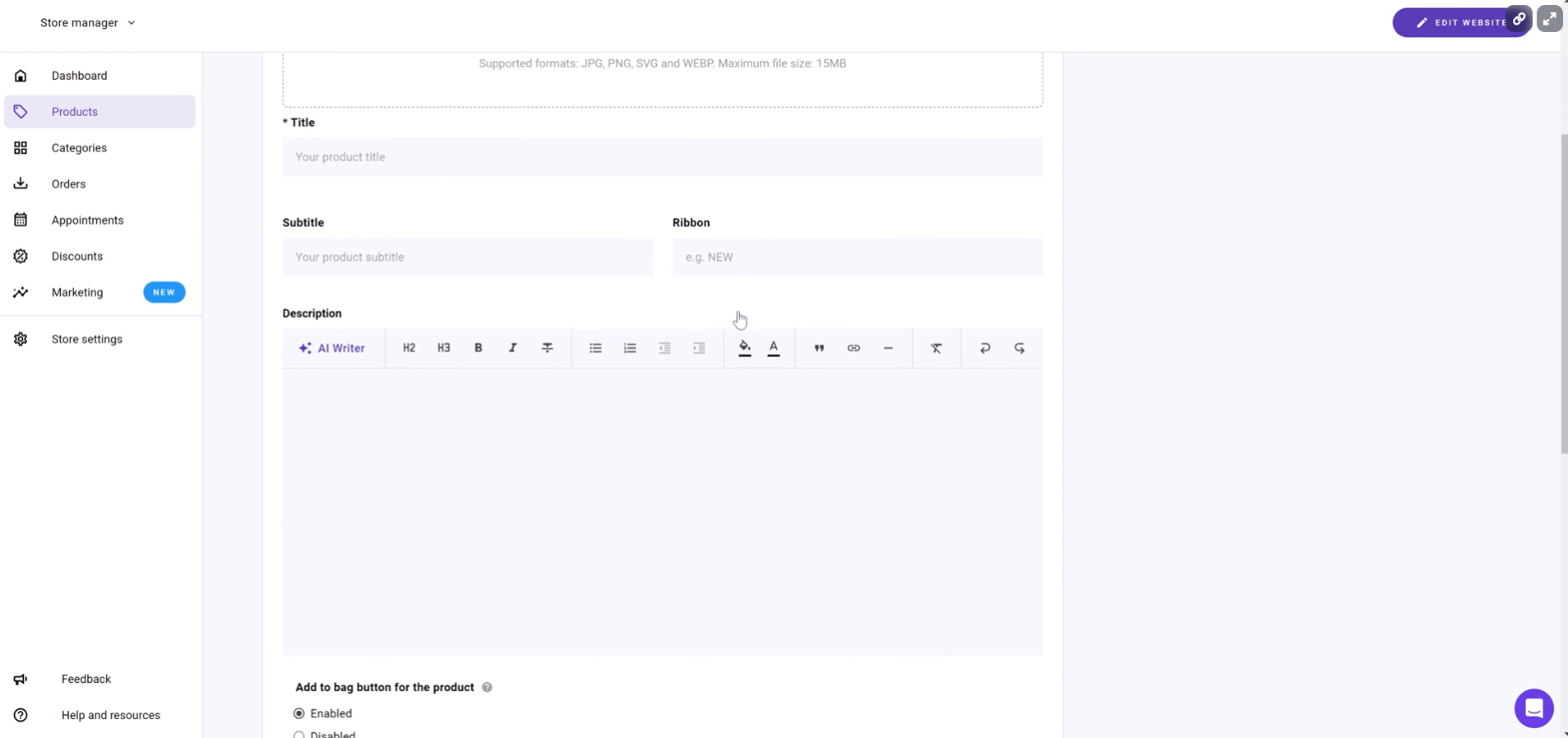
Ecommerce themes & templates
Webflow offers a diverse range of ecommerce themes and templates designed to cater to various types of online stores, from fashion and technology to artisan crafts and children’s products. Each template comes equipped with built-in ecommerce functionality, allowing you to easily add products and manage your store without the need for coding. In contrast, Hostinger Website Builder provides over 50 ecommerce templates out of its library of 140+, covering various styles and industries. These mobile-responsive templates offer pre-built functionalities such as product pages, shopping carts, and wishlists, but compared to dedicated platforms, the selection may feel smaller, and customization options might be more limited. Additionally, some advanced ecommerce features may not be available in all templates.
Product page customization
Webflow offers extensive customization options for eCommerce product pages, allowing users to design and personalize their pages without coding. It provides tutorials for creating product pages from scratch, offers responsive templates for various devices, and allows users to add custom code and dynamic content using Webflow’s CMS for maximum customization flexibility. On the other hand, Hostinger Website Builder’s product page customization includes editing basic elements, adjusting layout and design, and optimizing SEO settings. However, compared to dedicated ecommerce platforms, it falls short in terms of flexibility due to limited code access, restrictions on creating entirely new custom sections, and theme-specific limitations. Additionally, Hostinger offers fewer add-ons and integrations for advanced product page features, such as reviews and wishlists.
Payment processing
Webflow provides a flexible and secure platform for payment processing and ecommerce through integrations with leading payment gateways like Stripe and PayPal. This allows users to accept a wide range of payments, including credit card transactions directly from their websites. Given the versatility of Stripe and PayPal, businesses can manage online sales efficiently, and these integrations likely support various transaction types, potentially including POS transactions for physical sales environments. In contrast, Hostinger Website Builder provides basic ecommerce features, supporting popular payment gateways like PayPal, Stripe, and Square with no additional platform commissions on sales. However, it lacks built-in payment processing and integrated point-of-sale capabilities, necessitating reliance on third-party gateways and separate systems for in-person transactions. The platform supports various payment gateways, and users should refer to the Hostinger website for a comprehensive list based on their location and plan.
Website Editors
Website EditorsEvaluates the platforms’ website building and editing capabilities.Score Components:
- Customization tools (40%): Range and power of editing features.
- Editor usability (30%): User experience within the editor.
- Design flexibility (20%): Freedom in layout and design changes.
- Update and maintenance ease (10%): Simplicity of updating and maintaining the site.
 9.0
9.0
 7.4
7.4
🏆
Winner: Webflow
. With a score of 9.0, Webflow’s editor is praised for its intuitive visual interface that simplifies the process of designing and editing responsive websites without requiring deep technical knowledge. It offers a perfect blend of ease of use for beginners and the flexibility for more advanced users, enabling significant cost savings by allowing users to customize and manage their sites without hiring professionals.
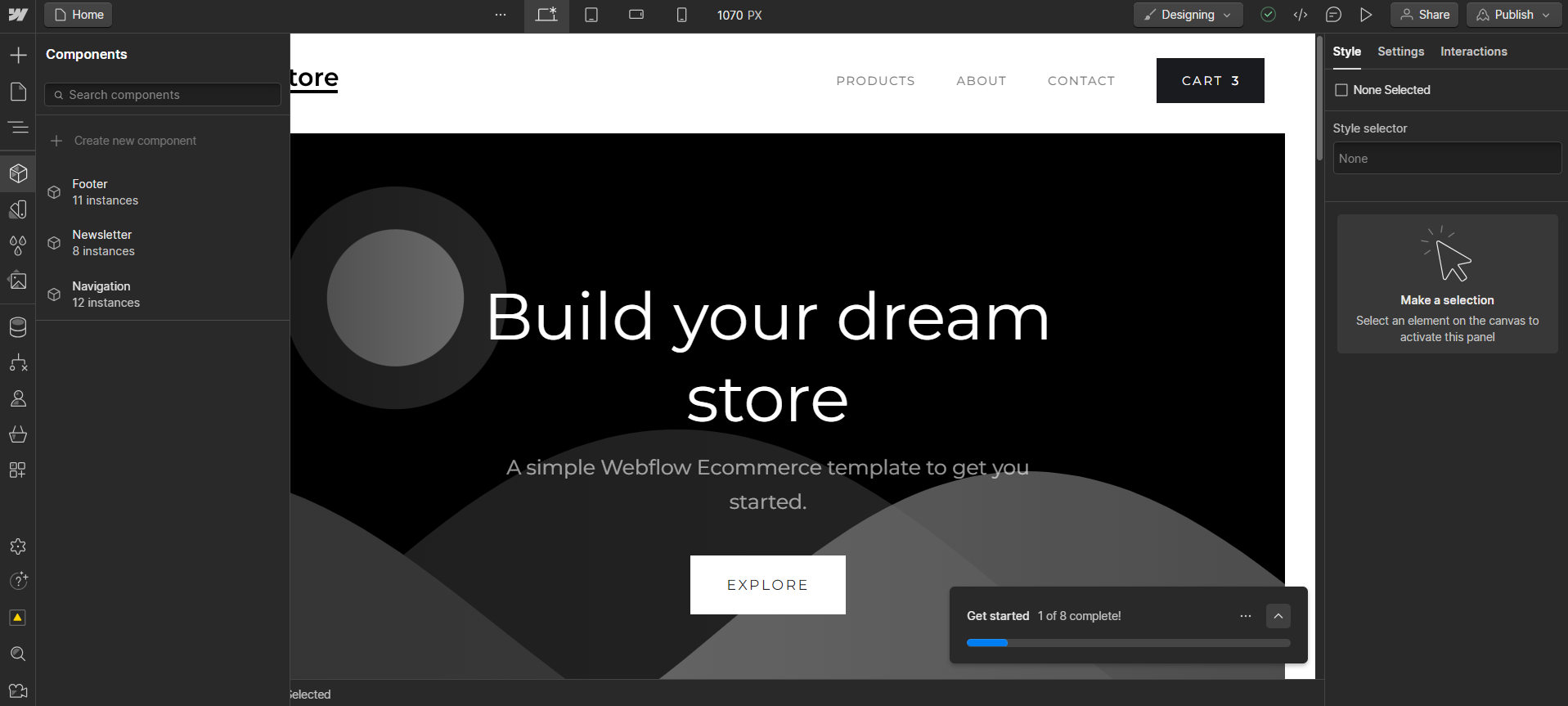
Hostinger Website Builder’s editor, scoring 7.4, stands out for its simplicity, featuring a drag-and-drop interface, intuitive layout, and pre-designed templates for easy website creation. With visual editing, beginner-friendly features like grid guidelines, and minimal learning curve aided by tutorials and support channels, it offers simplicity at both basic and advanced levels, making it accessible for users of various expertise.
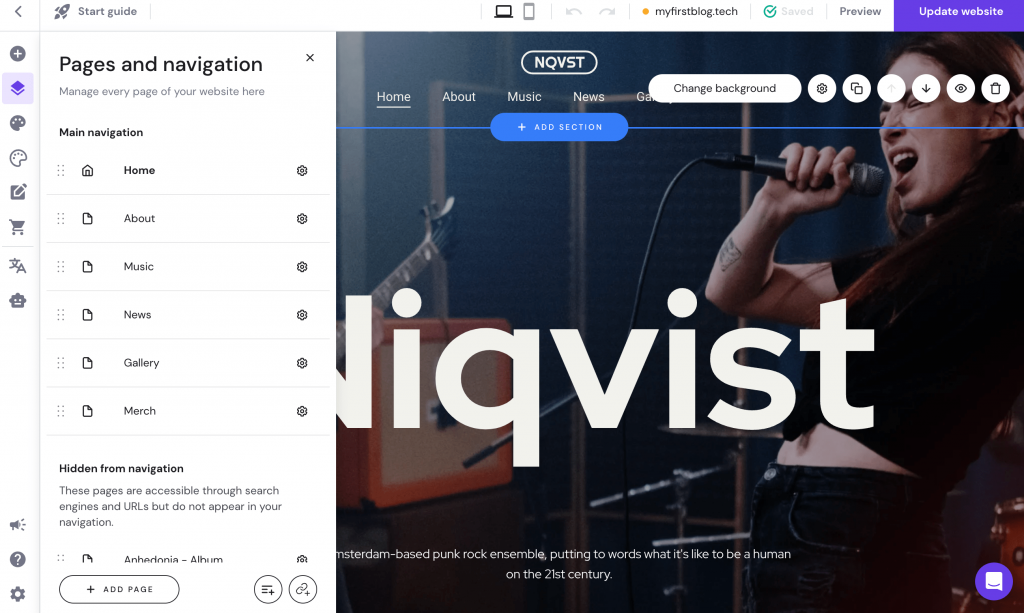
Mobile editor/app
 7.0
7.0
 5.5
5.5
🏆
Winner: Webflow
. Both Webflow and Hostinger Website Builder do not have a dedicated mobile editing app. However, Webflow has a third-party app called EditFlow, created by a community member for Webflow users, which is currently only available for iOS. This app provides some mobile editing capabilities for Webflow users, giving it an edge over Hostinger Website Builder.
On the other hand, Hostinger Website Builder offers a mobile-friendly interface that is directly accessible through your phone’s web browser. While this is a convenient feature, it does not provide the same level of functionality as a dedicated mobile app.
In summary, while both platforms could improve their mobile editing capabilities, Webflow comes out on top due to the availability of the EditFlow app.
Product testing options
Product Testing OptionsAssesses the options for trying out platform features before commitment.Score Components:
- Trial quality (40%): Extent and usefulness of the trial or free version.
- Feature accessibility (30%): How many features are available to test.
- Trial duration (20%): Length of the trial period.
- Ease of transition (10%): Smoothness of moving from trial to paid plans.
 6.3
6.3
 6.7
6.7
Overall Result
:
Hostinger Website Builder wins
. Hostinger Website Builder scores slightly higher than Webflow with a score of 6.7 compared to Webflow’s 6.3. While Webflow offers a free version with basic features, it does not provide a trial version or a money-back guarantee. On the other hand, Hostinger Website Builder does not have a free version but offers a 30-day money-back guarantee, during which users can test the premium features.

|

|
|
|---|---|---|
|
Free Plan |
Yes | No |
|
Trial Duration |
No | No (30-day money-back guarantee) |
|
Testing Premium Features |
Basic features with free plan |
During 30-day refundable period |
|
Money Back Guarantee |
No |
30 days |
Price
PriceLooks at the cost-effectiveness and value for money of each platform.Score Components:
- Plan value (40%): What each pricing tier offers.
- Transparency and clarity (30%): Clearness of pricing structures.
- Flexibility of plans (20%): Range of options to suit different budgets.
- Hidden costs (10%): Additional expenses not included in the plan.
 8.0
8.0
 9.0
9.0
Hostinger Website Builder offers more affordable pricing options compared to Webflow, with a significantly higher discount for annual subscriptions.
However, Webflow offers a custom-priced enterprise plan for large companies, while Hostinger Website Builder does not offer an enterprise plan.

|

|
|
|---|---|---|
|
Free |
Starter (Free): Limited features for new sites, including 2 static pages and 50 form submissions lifetime. |
No offering at this amount. |
|
$10-$13 |
No offering at this amount. |
Premium website ($11.99/month): Build 1 website with 10 GB storage, 100 GB bandwidth, custom domain & email, social media integration & SEO tools. Value for price: 7.5 |
|
$13-$20 |
Basic ($18/month): Suitable for simple sites with a custom domain, including basic SEO controls and 500 monthly form submissions. And 100 pages. Value for price: 6.5 |
Business website builder ($13.99/month): Build 1 website with custom domain & emails, AI website builder, AI image generator, AI writer, ecommerce features, marketing integrations and 0% transaction fees Value for price: 8.5 |
|
$20-$30 |
CMS ($29/month): For content-driven sites with 2,000 CMS items, 1,000 monthly form submissions, and full API access. And 150 website pages. Value for price: 7.5 |
No offering at this amount. |
|
$40-$45 |
Standard ($42/month): For new businesses with up to 500 ecommerce items, includes basic ecommerce features, and 2% transaction fee Value for price: 8.5 |
No offering at this amount. |
|
$45-$50 |
Business ($49/month): High traffic capacity, advanced features like site search, and up to 10 content editors. Value for price: 8.0 |
No offering at this amount. |
|
$80-$90 |
Plus ($84/month): Higher volume businesses with 0% transaction fees, up to 5,000 ecommerce items, and advanced features. Value for price: 9.0 |
No offering at this amount. |
|
$200+ |
Advanced ($235/month): Scalable solution for large online stores with up to 15,000 ecommerce items and the highest caps and 0% transaction fees. Value for price: 9.5 |
No offering at this amount. |
location. As a result in rare cases the prices displayed here can differ from the ones you see on their
websites.
Hosting quality
Hosting
qualityExamines the reliability and performance of the hosting solutions.Score Components:
- Uptime (40%): Consistency and reliability of website availability.
- Speed (30%): Loading times and performance.
- Bandwidth and storage (20%): Sufficiency of resources provided.
- Data centers (10%): Quality and distribution of hosting infrastructure.
 8.9
8.9
 7.2
7.2
🏆
Winner: Webflow
Webflow offers managed hosting with a 99.99% uptime, and leverages a globally distributed network of data centers from Amazon Web Services (AWS) and Fastly. Hostinger Website Builder, on the other hand, offers a variety of hosting types with a 99.9% uptime and data centers across the globe. However, Webflow’s superior uptime and managed hosting services give it the edge in this comparison.

|

|
|
|---|---|---|
|
Do they offer hosting? |
Yes, included in all paid plans |
Yes, included in all paid plans |
|
Data Centers: |
Webflow doesn’t actually have its own data centers. Instead, it relies on a globally distributed network of data centers from Amazon Web Services (AWS) and Fastly. |
Data Centers across the globe: USA, Europe, Asia, South America |
|
Type of hosting: |
Managed Hosting |
Shared Hosting, Cloud Hosting, WordPress Hosting, VPS Hosting |
|
Uptime: |
99.99% |
99.9% |
|
Uptime Guarantee: |
Only Enterprise plan, 99.99% |
Yes, 99.9% |
Website Speed Optimization
Website Speed OptimizationEvaluates optimization of website loading timesScore Components:
- PageSpeed Score (30%): Google’s score indicating performance optimization.
- Loading Time (30%): The average time until a website is fully interactive.
- Mobile Optimization (15%): Optimization effectiveness for mobile devices.
- Resource Optimization (15%): Optimizing images, scripts, and other heavy resources.
- CDN Usage (10%): Use of CDN to enhance speed across geolocations.
 8.1
8.1
 8.2
8.2
🏆 Winner: Hostinger Website Builder
Both Webflow and Hostinger Website Builder prioritize website performance and page speed, with Webflow focusing on custom cache settings, custom element lazy loading, automatic minification, responsive templates, and CDN, and Hostinger Website Builder emphasizing LiteSpeed Cache, Cloudflare CDN, MariaDB database, and browser caching. However, Hostinger Website Builder slightly outperforms Webflow in terms of website speed optimization.

|

|
|
|---|---|---|
|
Focus |
Custom Cache Settings, Custom Element Lazy Loading, Automatic Minification, Responsive templates, CDN |
LiteSpeed Cache, Cloudflare CDN, MariaDB database, Browser caching |
|
Performance Tools |
Google Lighthouse, PageSpeed Insights |
Google PageSpeed Insights Integration |
|
Key Strategies |
Custom Cache Settings, Custom Element Lazy Loading, Automatic Minification, Responsive templates, CDN |
LiteSpeed Cache, Cloudflare CDN, MariaDB database, Browser caching |
|
Load Times |
Below 2 seconds average |
2-3 seconds average |
|
Page Speed Scores Range |
77.2/100 |
80-95+/100 |
|
Core Web Vitals Improvement |
Improving components’ usability, and emphasis on LCP, FID and CLS |
Notable strides in enhancing Core Web Vitals (CWV) performance, reduced Largest Contentful Paint (LCP) through LiteSpeed Cache and Cloudflare CDN, improved First Input Delay (FID) with server-side optimizations, and minimized Cumulative Layout Shift (CLS) through CSS optimizations |
Webflow’s approach to enhancing site speed includes custom cache settings, custom element lazy loading, automatic minification, responsive templates, and CDN. It has an average load time of below 2 seconds and a PageSpeed score of 77.2/100. Webflow also focuses on improving components’ usability and emphasizes on Largest Contentful Paint (LCP), First Input Delay (FID), and Cumulative Layout Shift (CLS).
On the other hand, Hostinger Website Builder uses LiteSpeed Cache, Cloudflare CDN, MariaDB database, and browser caching to optimize website speed. It has an average load time of 2-3 seconds and a PageSpeed score range of 80-95+/100. Hostinger Website Builder has made notable strides in enhancing Core Web Vitals (CWV) performance, successfully reducing Largest Contentful Paint (LCP) through LiteSpeed Cache and Cloudflare CDN, improving First Input Delay (FID) with server-side optimizations, and minimizing Cumulative Layout Shift (CLS) through CSS optimizations. These efforts have led to significant improvements in overall CWV scores.
Get a head start on website creation with AI
Create a custom website tailored to your business needs 10X faster with 10Web AI Website Builder!
Plugins and integrations
Plugins and integrationsMeasures the range and effectiveness of additional plugins and integrations.Score Components:
- Variety of options (40%): Range of available add-ons.
- Integration smoothness (30%): Ease of integrating plugins into the site.
- Quality of plugins (20%): Functionality and reliability of the options.
- Custom integration capabilities (10%): Support for custom or third-party integrations.
 5.5
5.5
 4.7
4.7
🏆 Winner: Webflow.
With a score of 5.5, Webflow leads over Hostinger Website Builder, which scores 4.7. Webflow’s built-in library of website elements and functionalities, along with its third-party integrations, provide a wide range of options for enhancing website capabilities. On the other hand, Hostinger Website Builder offers around 20 free add-ons and premium ones for individual purchase, covering basic needs and offering additional functionalities. However, Webflow’s extensive integrations and constantly expanding library give it an edge over Hostinger Website Builder.
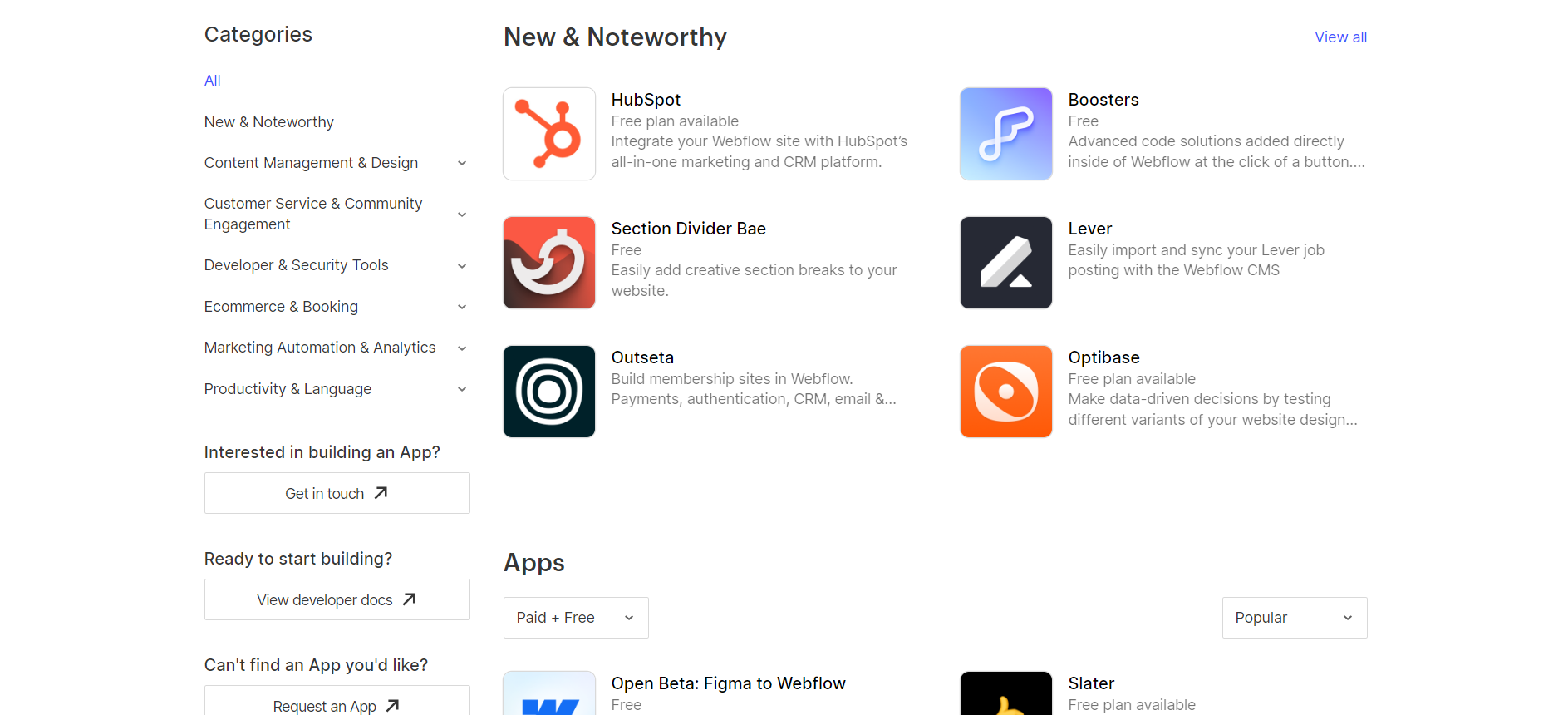
Marketing Features
Marketing featuresAssesses tools and options available for marketing.Score Components:
- SEO tools (40%): Effectiveness of SEO features.
- Marketing automation (30%): Availability and quality of marketing tools.
- Social Media integration (20%): Ease and depth of social media connectivity.
- Email marketing (10%): Quality and usability of email marketing tools.
 7.8
7.8
 5.8
5.8
🏆
Overall Winner: Webflow
. Webflow stands out for its more advanced marketing tools, especially in analytics and ad campaign management. Hostinger Website Builder is strong in SEO tools and blogging, ideal for content-driven strategies.

|

|
|
|---|---|---|
|
SEO Tools |
|
|
|
Email Marketing |
|
|
|
Blogging |
|
|
|
Social Media Integration |
Simplifies content sharing and audience engagement on major social platforms |
Simple social media links and sharing options |
|
Analytics and Reporting |
Integrates with Google Analytics for comprehensive web traffic and behavior analysis |
Basic analytics for website traffic and performance |
|
Ads and Promotions |
Supports ad and promotion management through integration with platforms like Google Optimize |
Limited direct ad tools but supports integrations for ad management |
Customer Support
Customer supportEvaluates the quality and availability of support options.Score Components:
- Response time (40%): Speed of support responses.
- Support quality (30%): Effectiveness and helpfulness of the support.
- Availability (20%): Range of support channels (phone, chat, email).
- Resource richness (10%): Quality of self-help and educational materials.
 8.3
8.3
 7.2
7.2
🏆 Winner: Webflow
. With a customer support score of 8.3, Webflow outperforms Hostinger Website Builder, which has a score of 7.2. Webflow offers 24/7 customer support through various channels, including live chat, email, and a community forum. They also provide extensive documentation and video tutorials to help users navigate their platform and troubleshoot common problems.
On the other hand, Hostinger Website Builder also provides comprehensive customer support through diverse channels, including 24/7 live chat, email responses within 24 hours, and phone support during specified hours in specific regions. However, unlike Webflow, Hostinger does not offer an enterprise plan, which could be a deciding factor for larger organizations.
Security
SecurityLooks at the platforms’ security measures and data protection.Score Components:
- Data protection (40%): Safeguards for user and customer data.
- SSL and encryption (30%): Implementation of secure connections.
- Compliance (20%): Adherence to industry security standards.
- Regular updates (10%): Frequency of security updates and patches.
 7.8
7.8
 8.2
8.2
🏆
Winner: Hostinger Website Builder
. Hostinger Website Builder edges out Webflow with a slightly higher security score. Hostinger provides robust security measures including regular updates, advanced firewalls, DDoS protection, anti-malware scans, and regular backups. They also offer database encryption, SSL certificates, two-factor authentication, and PCI-compliant hosting for ecommerce sites. Optional premium add-ons such as Sucuri Security and SiteLock are available for enhanced protection.
Webflow also provides strong security measures including SSL encryption, regular security audits and updates, strong password requirements, and two-factor authentication. However, it falls slightly short in comparison to the comprehensive security measures provided by Hostinger Website Builder.
AI Capabilities
AI capabilitiesMeasures the effectiveness of AI-driven features and tools.Score Components:
- Automation efficiency (40%): Impact of AI on streamlining processes.
- Personalization (30%): AI-driven customization for users or customers.
- AI-Assisted design (20%): Role of AI in website design and functionality.
- Data analysis (10%): Use of AI in interpreting user data and analytics.
 8.3
8.3
 6.1
6.1

|

|
|
|---|---|---|
|
AI Builder |
Not available yet, but announced for future release |
Available, with features like layout generation and basic content creation |
|
Ecommerce Features |
Not available |
Available, with features like AI Shop Generator and automated product descriptions |
|
Content Generation |
Not available yet, but announced for future release |
Available, with AI Writer tool for quick and easy content creation |
|
Additional AI Features |
Not available yet, but announced for future release |
Available, with features like AI Image Generator, AI Logo Maker, and AI Heatmap |
🏆 Winner: Hostinger Website Builder
. Despite its limitations, Hostinger Website Builder offers a range of AI capabilities that automate various aspects of website creation and management. These include layout generation, content creation, ecommerce features, and additional tools like an AI Image Generator and AI Logo Maker. On the other hand, Webflow does not currently offer AI capabilities, but has announced plans to introduce them in the future.
User Management
User ManagementAssesses the platforms’ capabilities in managing user roles, permissions, and accessibility.Score Components:
- Role Customization (40%): Flexibility in creating and defining user roles and
permissions. - Ease of Management (30%): User interface and tools for managing users.
- Access Control (20%): Effectiveness of access control measures for different user
levels. - Scalability (10%): Ability to manage a growing number of users efficiently.
 8.3
8.3
 6.3
6.3
🏆 Winner: Webflow
. Webflow and Hostinger Website Builder offer different approaches to user management.
- In Webflow, the number of users who can edit a website and their access levels vary by plan. Core, Growth, and Enterprise plans offer unlimited editors, while others limit content editors to 3 or 10 per site. Access levels include Designer for full access and Editor for content editing. Workspace roles like Admin, Designer, and Editor ensure collaboration and security through features like the Site Activity Log and role-based permissions.
- The number of users who can edit a Hostinger website depends on the hosting plan and the Website Builder edition chosen. For shared hosting, the Free plan allows only 1 user, Starter allows 2, Premium allows 5, and Business offers unlimited collaborators. In Cloud Hosting, Startup allows 2, Professional allows 5, and Enterprise offers unlimited collaborators. The Website Builder Pro edition, available on all plans, allows up to 10 collaborators.
Webflow User Roles and Access Levels:
| Role | Description | Access Highlights |
|---|---|---|
| Workspace Owner | Full control over Workspace settings and member management. | Edit settings, manage billing, access/edit all sites, invite/remove members, manage permissions. |
| Workspace Admin | Similar to the owner with some restrictions. | Edit settings, manage billing, access/edit all sites, invite/remove members (except owner), manage permissions. |
| Workspace Member | Limited control focused on site interaction. | Download invoices, access/edit sites, invite members. |
| Workspace Guest | Temporary collaborators with limited access. | Access/edit sites. |
| Workspace Commenter | Limited to commenting for feedback on sites. | Create/view/resolve comments, preview sites. |
| Site Admin | Full control at the site level. | Manage permissions, delete/transfer sites, billing management, design and publish changes. |
| Can Design | Design capabilities with some restrictions on publishing. | Design in Designer, create/modify classes and components, publish changes with permission. |
| Can Design (Limited) | Restricted design capabilities for Enterprise customers. | Create new classes, modify created classes, limited publishing capabilities. |
| Can Edit | Content editing without full design privileges. | Edit text/links/images, manage assets, publish Collection items and Ecommerce products. |
| Can Comment (Site Level) | Commenting for feedback at the site level. | Create/view/resolve comments, preview sites. |
Additional Features

|

|
|
|---|---|---|
|
SSL Certificate |
|
|
|
Custom Domain |
|
|
|
Free Custom Domain Included |
|
|
|
International Domains |
|
|
|
Mobile Responsive |
|
|
|
Page Speed |
|
|
|
Website Builder Mobile App |
|
|
|
Convert a Website To An App |
|
|
|
Website Analytics |
|
|
|
Multilingual Sites |
|
|
|
Multiple Users |
|
|
User Feedback
Webflow is highly praised for its user-friendly interface, which eliminates the need for coding while offering extensive design flexibility. Users appreciate its scalability, cost-effectiveness, and seamless integration of essential features like forms and CMS. However, some users note a slight learning curve and occasional limitations, particularly in ecommerce functionalities and content management. Overall, Webflow proves to be a powerful tool for building and managing websites, offering robust features for both beginners and experienced developers, albeit with some room for improvement in certain areas like collaborative editing and content management.
Hostinger Website Builder is favored for its ease of use, affordability, and strong customer support, making it an attractive option for users, especially those new to website building. However, there are areas for improvement, particularly in offering more diverse templates, enhancing ecommerce features, and streamlining customer support responsiveness. These insights reflect a balance of satisfaction with areas that could benefit from further development.
The making of this blog
We followed a clear, step-by-step process to write and research this article.
FAQ
Which platform is better for professional designers, Webflow or Hostinger Website Builder?
Is Hostinger Website Builder a good option for beginners?
How do Webflow and Hostinger Website Builder compare in terms of ecommerce capabilities?
Which platform offers better customer support?
Can I use both platforms for creating a multilingual site?
Which platform is more affordable?
Are there any AI capabilities available in Webflow and Hostinger Website Builder?
Which platform is recommended for users with no coding knowledge?










